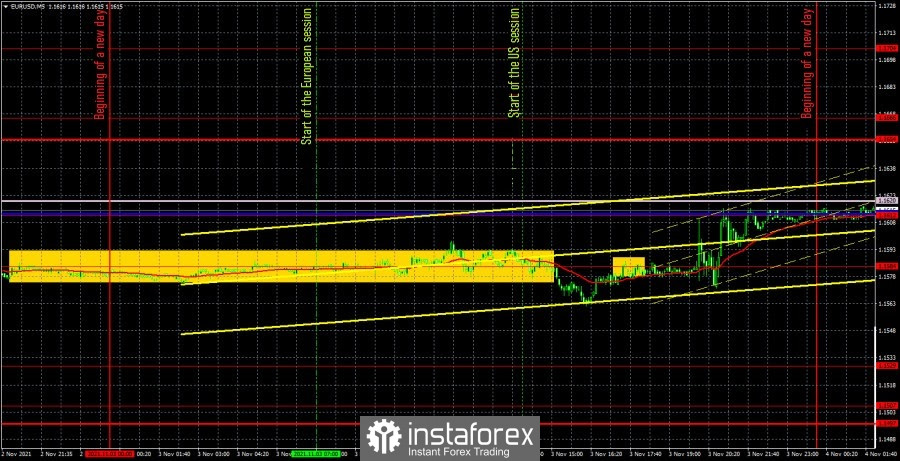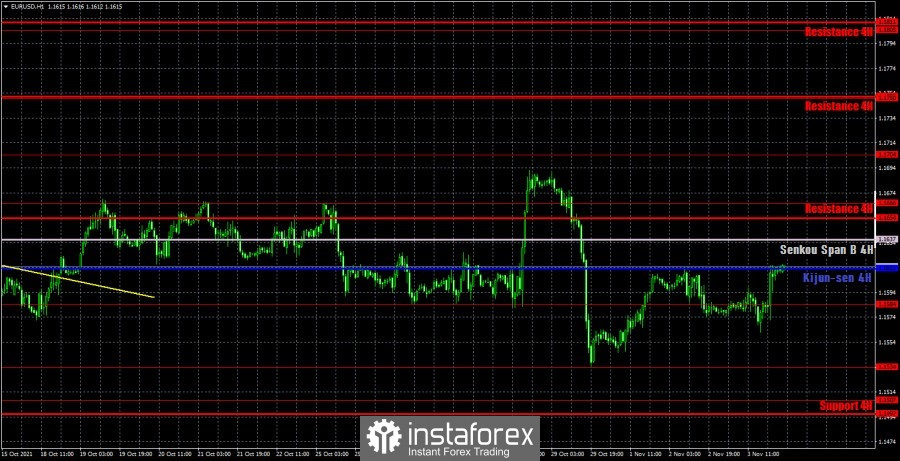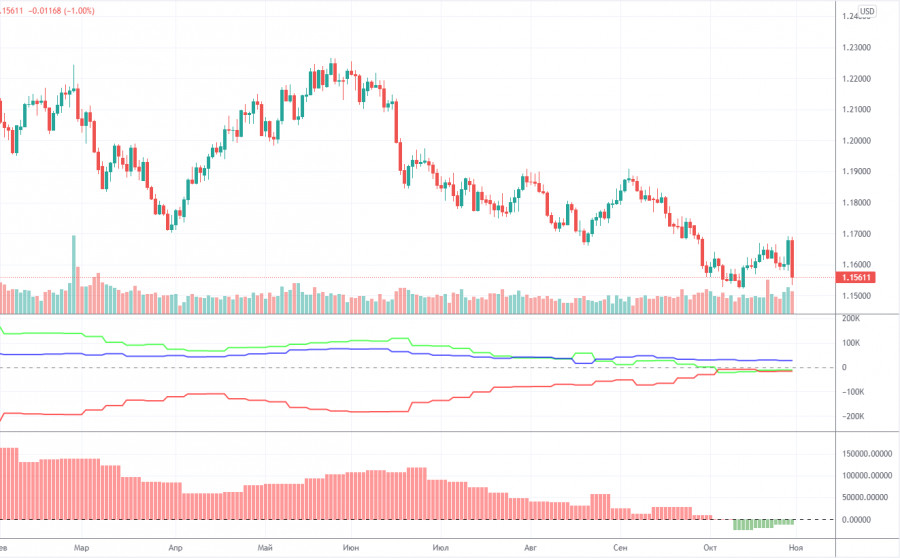EUR/USD 5M

The EUR/USD pair showed volatility equal to... 36 points on Wednesday. Point. The volatility data are calculated prior to the release of the results of the Federal Reserve meeting. Obviously, during the publication of such important data, volatility is rising, but at the same time, traders should have already left the market by this time. Thus, in any case, we are not too interested in the evening movements of the EUR/USD pair. Moreover, they may be absolutely inconsistent with the nature of the published information. In general, we will consider the pair's movement only for the part of the day when traders could trade. Macroeconomic reports in this part were also available, but judging by the 36 points of volatility, traders did not pay any attention to it. And even if they did, is anyone interested in a 10-point market reaction? Thus, we can assume that the report on European unemployment, Market participants "passed" European Central Bank President Christine Lagarde's speech, the report on the change in the number of employed in the US ADP private sector, the indexes of business activity in the US services sector. We did not even begin to plot the time of the release of this data on the chart, but instead plotted one long rectangle, which indicates an absolute flat during the day. Moreover, this flat began a day earlier. As you might guess, no trading signals were generated during the past day. The only more or less significant signal was formed near the level of 1.1584 in the late afternoon. However, the closeness of the evening and the announcement of the results of the FOMC meeting did not allow traders to enter the market on this signal. Thus, yesterday had a frankly semi-holiday status. The Fed meeting and its results will be discussed in today's articles.
EUR/USD 1H

On the hourly timeframe, all of yesterday's movements are absolutely unimportant. Recall that at this time there is no trend on this timeframe, the pair's quotes were in absolute flat with low volatility for most of yesterday, and the evening movements were not able to change the current technical picture. Thus, it does not matter at all where the price of the hourly timeframe is now. The important thing is that there is still no trend line or trend channel. On Thursday, we highlight the following levels for trading - 1.1507, 1.1534, 1.1584, 1.1666, 1.1704, as well as the Senkou Span B (1.1613) and Kijun-sen (1.1637) lines. The Ichimoku indicator lines can change their position during the day, which should be taken into account when looking for trading signals. Signals can be rebounds or breakthroughs of these levels and lines. Do not forget about placing a Stop Loss order at breakeven if the price moves 15 points in the right direction. This will protect you against possible losses if the signal turns out to be false. Another speech by Christine Lagarde will take place in the European Union on November 4, as well as the publication of the index of business activity in the service sector and the forecast for the economy from the European Commission. Only a minor report on the number of applications for unemployment benefits in America. Despite the fact that European events are quite interesting in their "signage", most likely, the markets will ignore them today, as well as similar statistics and events yesterday.
We recommend you to familiarize yourself:
Overview of the EUR/USD pair. November 4. Macroeconomic statistics and Christine Lagarde's speech.
Overview of the GBP/USD pair. November 4. Ahead of the Bank of England meeting.
Forecast and trading signals for GBP/USD for November 4. Detailed analysis of the movement of the pair and trade deals.
Analysis of the COT report

The mood of non-commercial traders practically did not change during the last reporting week (October 19-25). A group of non-commercial traders opened 4,000 sell contracts (shorts) and 4,000 buy contracts (longs). Consequently, the net position of professional players has not changed. And if so, then the mood of the large traders remained... bearish. Yes, exactly bearish, as evidenced by both indicators in the chart above. The green and red lines of the first (net positions of non-commercial and commercial players) continue to move towards each other, which still means that the upward trend is ending. Or the downward correction is delayed. Recall that the process of convergence of these lines began at the beginning of the year, when the upward movement stopped. At this time, this whole process does not even fit into a chart - the downward movement continues for so long, which we still consider to be a correction. The most interesting thing is that the last two trading days this week did not make it into the latest COT report. That is, we do not know how the major players traded on Thursday and Friday, when the pair passed about 250 points. It should also be noted that the net position of non-commercial traders remains below zero. That is, the number of short positions exceeds the total number of long positions. Consequently, based on the COT reports, the fall of the European currency may continue. The nearest target, as we have already said, is the important level of 1.1490. So far, the COT reports absolutely do not provide a conclusion about a change in trend.
Explanations for the chart:
Support and Resistance Levels are the levels that serve as targets when buying or selling the pair. You can place Take Profit near these levels.
Kijun-sen and Senkou Span B lines are lines of the Ichimoku indicator transferred to the hourly timeframe from the 4-hour one.
Support and resistance areas are areas from which the price has repeatedly rebounded off.
Yellow lines are trend lines, trend channels and any other technical patterns.
Indicator 1 on the COT charts is the size of the net position of each category of traders.
Indicator 2 on the COT charts is the size of the net position for the non-commercial group.
The material has been provided by InstaForex Company - www.instaforex.com